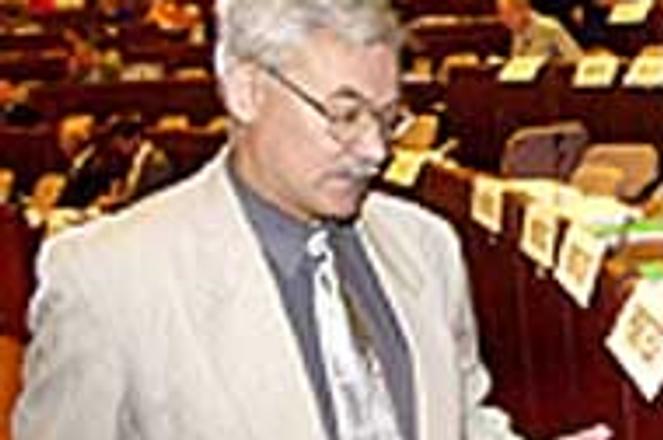As opposition HZDS party MPs boycotted the chamber in protest, parliament pushed through the long-awaited law.photo: TASR
Having been debated, shot-down, revisited and mulled-over for almost a year, the most recent draft of Slovakia's new Telecom Law finally received parliamentary approval on May 19. The law's passage marks the clearance of the first major hurdle on the way to the privatisation of the state-owned fixed-line telecom monoploy Slovenské telekomunikácie (Slovak Telecom - ST). President Rudolf Schuster was expected to give his stamp of approval during the week of May 22, and the law is anticipated to go into effect in early July.
Negotiations and alterations to the submitted draft continued until the final hour before it finally received approval. Those involved in its ultimate configuration expressed an overall satisfaction, with only minor criticisms. The most vocal critics of the draft, mobile-phone operators Globtel and Eurotel, refused to comment on the law's acceptance, yet many of their concerns were said to have been addressed.
Jaroslav Volf, head of the Parliamentary Committee for Economy, Privatization and Business, submitted a formal complaint the day before the bill went to parliament protesting what he said was favouritism given to ST. The main sticking point was a stipulation regarding 'universal service' (whereby mobile service operators would have to help cover the costs of providing mobile phone service to remote regions of the country), a concern expressed by Globtel in an April 25 interview with The Slovak Spectator.
However, Volf said that the majority of his issues had been addressed in the final version of the law. "I think that the bill was analysed with a lot of details," he said. "Through parliament's negotiations, there were 72 accepted changes and additions. I think that the changes helped to improve the bill."
Volf's only remaining objection was rooted in who would assume future regulatory responsibilities, a role now expected to be filled by the Telecom Ministry. While this may not present a problem in the interim, he said, the issue will need to be addressed in 2002 when the market is liberalised. In order to ensure objectivity, Volf continued, the regulatory body should be independent of the government with its own budget.
Stanislav Vanek, the Telecom Ministry's Regulatory Department Director, said that the European Union would eventually impose obligations which all telecom services operators must adhere to, including mobile operators. But for the time being, a regulatory body must oversee the cost distribution on providing 'universal service', even if mobile operators don't want to offer service to the more remote regions because of the expenses involved. By the end of 2002, he said, this obligation would no longer be imposed on mobile operators.
Other objections by the mobile operators were explained by Marek Staron, head advisor for White & Case - the legal firm in the Deutsche Bank-led advisory consortium for the ST privatisation - who said that prior to the draft's acceptance, Globtel and Eurotel had submitted a common statement that touched on eight major items of concern. One of their major grievances, he said, was that the law stipulated that having a 25% share of the mobile market would place them under regulatory control, while EU laws state that regulation is not necessary unless a 50% market share is reached.
Staron, however, said that in practice most EU states regulated mobile operators once they had achieved a 25% threshold, even though the law set a higher figure. The complaint of EuroTel and Globtel, he added, were without merit.
"It is natural that the operators of mobile services are not very pleased with the threshold of 25%, because both have already achieved this. But generally, among EU countries, it's not normal to adopt 50% thresholds," Staron said.
Slovakia's EU aspirations also reverberated throughout negotiations on the telecom law.
Staron said that the new law was just a framework around which future legislation would be formed. He described the law as a good foundation for regulating the present system, while further measures would inevitably need to be adopted in order for it to be compliant with EU norms.
"Slovakia is not under obligation to have the law fully compliant [yet]. This concern was not one of the priorities, but the ministry definitely did want a law that was EU-ready, so it was very important to them to have it as close to EU regulations as possible for this present market."
In the nick of time
Appeasing the market players was not the only concern for those drafting the bill. Timing also played a major role in the process. Analysts have said time and again that as the delays mounted, the ultimate selling price offered by the bidders (Telekom Austria, Deutche Telekom and Dutch firm KPN) for a 51% stake in ST would fall in proportion to the diminishing time available for the company that purchases ST to prepare properly for international competition.
"The pressure for accepting this law has been enormous," Volf said.
Staron agreed: "We wouldn't be engaged in this at all if it weren't for the issue of necessity from the point of view of the potential investors. All three had a pre-condition for submitting their bid - to have the law adopted by parliament [in a timely fashion]."
Regardless of the time crunch and other constraints, the overall sentiments of those affiliated with drafting the law was that the end results were adequate and well-balanced.
"If there had been more time, we would have been able to word it more precisely, but it should be OK. Such changes wouldn't change the meaning, they are only small items and are not important for the meaning of the law," Vanek said.


